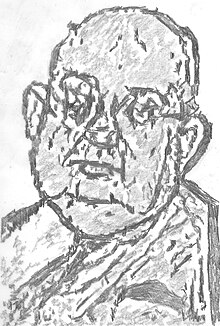A. J. Liebling
| A. J. Liebling | |
|---|---|
 |
|
| Born |
Abbott Joseph Liebling October 18, 1904 New York City, New York, United States |
| Died | December 28, 1963 (aged 59) New York City, New York, United States |
| Cause of death | Bronchopneumonia |
| Occupation | Journalist |
| Spouse(s) | Ann Beatrice McGinn (1934-1949; divorced) Lucille Spectorsky (1949-1959; divorced) Jean Stafford (1959-1963; his death) |
Abbott Joseph "A. J." Liebling (October 18, 1904 – December 28, 1963) was an American journalist who was closely associated with The New Yorker from 1935 until his death.
Liebling was born into a well-off family on the Upper East Side of Manhattan, where his father worked in New York's fur industry. His mother, Anna Adelson Slone, was from San Francisco. After early schooling in New York, Liebling was admitted to Dartmouth College in the fall of 1920. His primary activity during his undergraduate career was as a contributor to the Jack-O-Lantern, Dartmouth's nationally known humor magazine. He left Dartmouth without graduating, later claiming he was "thrown out for missing compulsory chapel attendance". He then enrolled in the School of Journalism at Columbia University. After finishing there, he began his career as a journalist at the Evening Bulletin of Providence, Rhode Island. He worked briefly in the sports department of the New York Times, from which he supposedly was fired for listing the name "Ignoto" (Italian for "unknown") as the referee in results of games.
In 1926, Liebling's father asked if he would like to suspend his career as a journalist to study in Paris for a year.
I sensed my father's generous intention and, fearing that he might change his mind, I told him that I didn't feel I should go, since I was indeed thinking of getting married. "The girl is ten years older than I am," I said, "and Mother might think she is kind of fast, because she is being kept by a cotton broker from Memphis, Tennessee, who only comes North once in a while. But you are a man of the world, and you understand that a woman can't always help herself..." Within the week, I had a letter of credit on the Irving Trust for two thousand dollars, and a reservation on the old Caronia for late in the summer, when the off-season rates would be in effect.
Liebling later wrote that the unsuitable proposed marriage was a fiction intended less to swindle his father than to cover his own pride at being the recipient of such generosity.
...
Wikipedia
